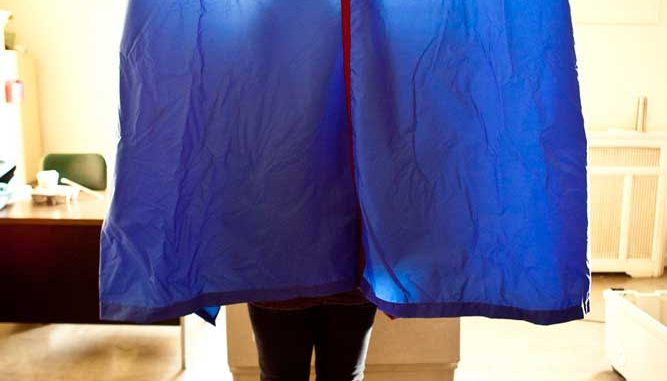

Mayor Michael Nutter held a public session on Feb. 28 at Bright Hope Baptist Church, where his staff heard concerns from Temple-area voters about problems stemming from last November’s election.
Voters said it was a scene of confusion and chaos on Election Day. At polling locations around campus, many Temple students were left guessing as they found their names hadn’t appeared in the voter rolls, or that they had shown up at the wrong location. Others had trouble finding any record that they were registered to vote at all.
Dylan Morpurgo, president of the Temple College Democrats, shared complaints from Temple voters who faced some of the widespread problems on Election Day.
“Students reported that some locations set up ‘Temple lines’ made up of just students coming to vote,” Morpurgo said. “Many did not show up as being registered to vote or their names weren’t on the poll books.”
All voters who did not show up on the poll books were required to cast a provisional ballot, no matter what form of identification or registration status they showed. Provisional ballots were not counted on Election Day, but the city was inundated with voters who had to cast them, more than double the totals seen in previous elections.
TCD and PennPIRG, a local government watchdog organization, collected data from Temple students who had to vote provisionally on Election Day.
Chanel Ross, who worked for PennPIRG on Election Day, said she and her fellow volunteers were angry at the city for the influx of provisional ballot voters.
“The problem was that so many votes weren’t counted that day,” Ross said.
Morpurgo said TCD compiled a list of up to 40 students who had to cast provisional ballots.
Morpurgo said TCD registered Temple students and many did not get official confirmation they were registered until six weeks after the fact.
“We made efforts to ensure students were registered,” Morpurgo said. “I sent a request to [City] Commissioner [Stephanie] Singer’s office for around 200 to 300 registration forms.”
Morpurgo said a person in her office told him: “There are too many people running around campus trying to get people registered.”
Singer apologized for the conduct of her office, saying she was shocked that they would say something like that.
Singer said the provisional ballot issues could be mitigated in the future through the integration of better technology in the voting system.
“I proposed in September that we should find a way to track provisional ballots in real time,” Singer said. “This is something that is technologically feasible right now, but the other two commissioners weren’t interested, and it got voted down.”
Singer said the problem was magnified by an error in the state’s voter registration system, but safeguards have since been put in place against such a mishap in future elections.
“There were people who had voted for ages who didn’t show up in the rolls,” Singer said. “It should not have happened. It’s both our fault and the state’s fault that we had so many provisional ballots.”
According to a report released by Singer in December 2012, thousands of provisional ballots were estimated to have come as a result of the Department of State’s error. The report said a total of 27,395 provisional ballots were cast in Philadelphia.
Sonia Galiber, junior political science major and event coordinator for TCD, said the city was not prepared for so many provisional ballots, and many polling places around campus ran out of them in the middle of Election Day. At one location near Main Campus, Nutter personally called and requested more provisional ballots.
“A lot of students were not able to wait for provisional ballots to get there,” Galiber said. “So they left without voting.”
Managing Director Richard Negrin expressed concern that the large amount of voting issues may have deterred students and residents from voting.
Morpurgo said the problems caused delays and long lines at polling places around campus.
“Some students could not afford to wait, because they had to go to class, and they had to walk away without voting,” Morpurgo said.
Morpurgo said he received distressing reports from students who had to cast provisional ballots without any privacy.
“Fifteen students were filling out ballots, all at once, at a table in front of a poll worker,” Morpurgo said. “There was no secret ballot.”
Tom Gregory, who worked his third year as a poll worker last November, witnessed a large number of voters coming to his location after their original polling place was closed due to ADA accessibility violations.
“Most people had no clue where to go,” Gregory said. “They split the polling place and redirected the voters. Half came to us and half went somewhere else.”
Gregory said many of the voters had to cast provisional ballots, because they came to the wrong place. Though they had to provide many more than in previous years, Gregory said his location did not run out of provisional ballots.
Nutter and his team pledged to hear the stories and recommendations from voters as part of an effort to figure out ways to improve elections in the future.
Temple students can share their election experiences and offer recommendations to the mayor by visiting www.phila.gov/eleciton2012 or by calling 267-209-FACT.
Joe Gilbride can be reached at joseph.gilbride@temple.edu.


Be the first to comment